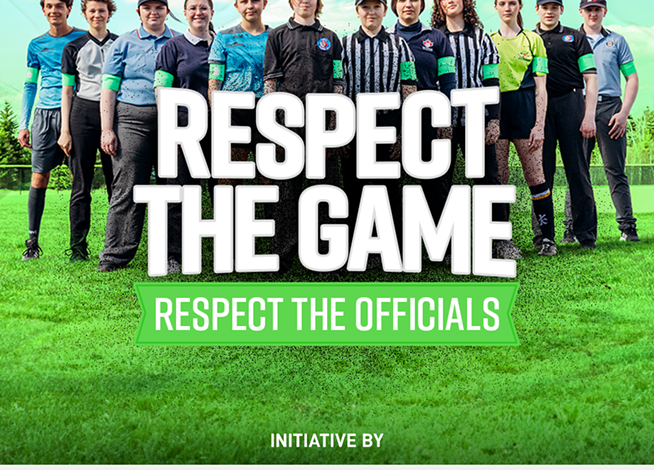Green Arm Band Initiative reminds us that referees are human beings

The other day I was at The Gap and I saw the most disturbing thing. The teenage sales associate was being followed around by this middle-aged man, and—as she tried to do her job—he was correcting her, even yelling at her. He was berating her at every turn.
She folded a stack of t-shirts and he screamed “You missed one!” She dropped a pair of jean shorts and he roared “Are you blind?” She told another shopper they were out of medium hoodies and he jumped at her—red-faced and with veins popping out of his neck—and simply yelled “You suck!”
I know what you’re thinking: that is insane behaviour, right?
Now, just swap out The Gap for The Mainland Common soccer pitch and the teenage sales associate for a referee. Do you feel differently now? Does a sports field make verbally abusing teenagers at work more acceptable?
Because that’s what youth sports referees are. They are human beings just trying to do their job to the best of their ability. That’s the message that Sport Nova Scotia’s Green Arm Band Initiative is hoping to convey loud and clear.
This summer, referees and officials across eight sports in the province will wear green arm bands as a reminder to respect and protect these young officials and that, just like players, they are learning the game.
“I think people forget that they’re yelling at humans out there on the field that are trying to do a job,” says Brandon Guenette, executive director of Baseball Nova Scotia and co-founder of The Green Arm Band Initiative. “And a lot of these humans they are yelling at are minors. There are not many places in life where you can just scream at a minor; it’s unacceptable.”
The initiative will include officials in baseball, basketball, football, lacrosse, rugby, soccer, softball and volleyball—creating a unified voice.
“No matter what sport or combination of sports your kids play, parents are going to see this green arm band and understand what it means and maybe that will make them think twice about what they say,” explains Guenette.
The emotional toll that the abuse has on referees is reflected in the retention rate season over season (or lack of retention). Which makes sense when you think about it: who would want to knowingly subject themselves to it?
“We lose close to half our officials every year,” says Guenette. “You want to see the umpires progress and develop, but that’s not happening when they leave after only one or two years.”
This all begs the question: what is going on in the minds of parents these days?
Juan Marquez—a former referee of 15 years—is currently the referee development officer for Soccer Nova Scotia. He says that he saw a huge change in parent behaviour after Covid.
“There has been a social change. People are more vocal, they want to express their irritation and everything is immediate,” says Marquez. “So when we’re talking about the game, the issue is not between the kids because the players are kids and the referees are kids. The problem is with the adults involved.”
He thinks that different factors like parents becoming more educated on the game and money and time investments have upped the stakes for young players; placing a greater emphasis on competition rather than fun.
“The typical phrase they use now is ‘I’m passionate’. ‘I’m passionate about my kid and I care about the game’,” says Marquez. “Well, guess what? Your passion is not justifiable when you’re channeling it at another kid.”
And let’s not get it twisted. We’re talking about recreational sports here. Nobody is being paid, nobody is professional. Quite the opposite actually. Kids are playing sports to have fun, work as a team and get some much-needed physical activity. The stakes literally couldn’t be lower.
“It’s the parents that are taking it seriously because maybe they watch sports on TV and think they’re experts,” says Marquez. “But the young referees know the game and they’re also learning how to be an authority figure, which is not easy. They are brave to be reading the plays, making the calls and controlling the game. Somebody has to be in charge.”
Which goes back to the retention problem. Somebody does have to be in charge of the games in order for youth sports to even be a thing. And with the retention rate being what it is, things like tournaments will soon become a thing of the past because there simply aren’t enough young people willing to put up with it all.
“A few weeks ago we had a tournament and a young female was refereeing and the people were constantly criticizing and second-guessing her calls, yelling ‘that’s a foul!’,” says Marquez. “And at the end of the game, she just started crying.”
It would go a long way for parents to remember that the teenage girl they are so openly criticizing is also somebody’s child—just like theirs—out there on the field trying to learn the game and do their best.
And in case they forget that in all their “passion”, she’ll be the one with the green arm band on.




